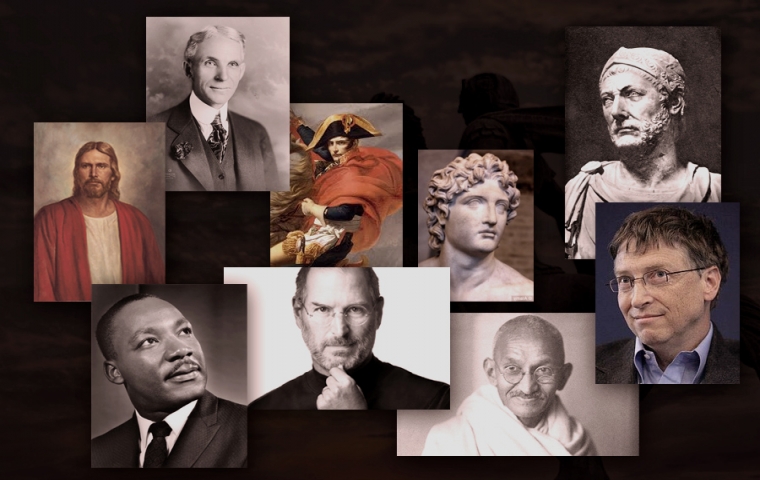10 People Who Brought New Ideas That Inspired the World
These people have changed our way of thinking and perception
10. Confucius (551-479 BC)

Lived from 551 to 479 BC, and remains the most important single philosopher in Eastern history. A Chinese teacher, editor, politician, and philosopher of the Spring and Autumn period of Chinese history.
He adopted significant principles of ethics and politics, in a time when the Greeks were espousing the same ideas. We think of democracy as a Greek invention, a Western idea, but Confucius wrote in his Analects that “the best government is one that rules through ‘rites’ and the people’s natural morality, rather than by using bribery and coercion. This may sound obvious to us today, but he wrote it in the early 500s to late 400s BC. It is the same principle of democracy that the Greeks argued for and developed: the people’s morality is in charge; therefore, rule by the people.
9. Karl Marx (1818-1883)

The philosopher, social scientist, historian and revolutionary, Karl Marx, is arguably the most influential socialist thinker to emerge in the 19th century. Against the backdrop of Victorian Capitalism, Karl Marx and Frederich Engels wrote the Communist Manifesto, which along his anticapitalist work Das Kapital, form the basis of Marxism, which called for a revolution to dethrone capitalism and replace it with a Communist society based on equality.
Communism was an important feature in the Russian revolution, and led to a polarising of politics during the Twentieth Century, and was supported by many countries seeking liberation from colonial rule.
Even today, all of the debates we see and hear that are related to globalisation, poverty, inequality, environmental damage, obsession with consumerism... all lead directly from a battle of ideas that dates from Karl Marx.
8. Friedrich Nietzsche (1844-1900)

German philosopher, cultural critic, composer, poet, philologist, and a Latin and Greek scholar. He began his career as a classical philologist before turning to philosophy.
His writings on truth, morality, language, aesthetics, cultural theory, history, nihilism, power, consciousness, and the meaning of existence have exerted an enormous influence on Western philosophy and intellectual history.
Nietzsche claimed the exemplary human being must craft his/her own identity through self-realization and do so without relying on anything transcending that life - such as God or a soul. This way of living should be affirmed even were one to adopt, most problematically, a radical vision of eternity, one suggesting the "eternal recurrence" of all events... His works continue to draw the attention of contemporary intellectual historians and philosophers.
7. Gautama Buddha (c. 563/480 - c. 483/400 BC)

Also known as Siddhartha Gautama, Gautama Buddha was a spiritual leader and teacher whose life serves as the foundation of the Buddhist religion.
Buddha was born as a prince into luxury in the 6th century BC. However, when he grew up, he embarked on a journey of self-discovery. After a long spiritual search he went into deep meditation, where he realized the nature of mind. He achieved the state of unconditional and lasting happiness: the state of enlightenment, of buddhahood. This state of mind is free from disturbing emotions and expresses itself through fearlessness, joy and active compassion. For the rest of his life, the Buddha taught anyone who asked how they could reach the same state.
Through Buddhism, he has influenced lives of millions people all over the world.
6. Albert Einstein (1879-1955)

Generally considered one the most respected and influential scientists of all time.. Albert Einstein was a German mathematician and physicist who, throughout his life, came up with a number of interesting and revolutionary concepts, ideas, and theories.
It was the Theory of Relativity, though, that made him one of the greatest historical figures to change the world. His work also had a major impact on the development of atomic energy, which foreshadowed the development of atomic power and the atomic bomb. In his later years, Einstein focused on unified field theory. With his passion for inquiry, Einstein is generally considered the most influential physicist of the 20th century.
Even now, a century later, Einstein’s Theory of Relativity is still reshaping how the modern scientific community thinks as they search for a grand Theory of Everything.
5. Plato (428/427 or 424/423 - 348/347 BC)

Student of Socrates (c. 470–399 BCE)... Teacher of Aristotle (384–322 BCE)... Plato is the founder of the Academy in Athens, the first institution of higher learning in the Western world which many consider to be the first Western university.
Plato is one of history's most influential philosophers. His contributions range across numerous philosophical subfields, including (but not limited to) ethics, cosmology, and metaphysics. Though he was not a scientist in the modern sense, Plato also examined the natural world and the philosophical implications it held.
He is widely considered the pivotal figure in the development of Western philosophy. Unlike nearly all of his philosophical contemporaries, Plato's entire work is believed to have survived intact for over 2,400 years.
4. Hammurabi - The Lawmaker (1810-1750 BC)

Hammurabi, the famous King of Babylon set out a code of laws that helped transform and stabilise his city into the most powerful of all Mesopotamia. His code, a lasting contribution on western society, was written on twelve stones and displayed publicly for all to see, thus ignorance of the law was never accepted as an excuse, this principle lives on in most societies today. The most common being law, "Eye for eye, tooth for tooth".
Hammurabi’s laws were copied by other civilisations and they set several important principles that are still cornerstones of justice in many parts of the world. For example, they established the principle that a person is innocent until proven guilty. But to maintain proper order, these laws were necessarily harsh, for example: ‘If a man put another man’s eye out, his eye should be put also.’ Another one that probably didn’t give them the biggest incentive to study medicine was as follows: ‘If a patient dies in or after surgery, the doctor’s hand will be cut off.’
3. Aristotle (384 - 322 BC)

Student of Plato... Tutor of Alexander the Great... Aristotle founded his own school, the Lyceum, in Athens, where he spent most of his life studying, teaching and writing. He is considered the first to have written systems by which to understand and criticize everything from pure logic to ethics, politics, literature, even science.
Aristotle’s work on philosophy influenced ideas from late antiquity all the way through the Renaissance, as he focused in his works on the systematic concept of logic. Aristotle’s objective was to come up with a universal process of reasoning that would allow man to learn every conceivable thing about reality. The initial process involved describing objects based on their characteristics, states of being and actions.
Aristotle’s influence on Western thought in the humanities and social sciences is largely considered unparalleled, with the exception of his teacher Plato’s contributions, and Plato’s teacher Socrates before him.
2. Charles Darwin (1809-1882)

One of the greatest names in science, and a man who forever changed the way that we perceive ourselves and all other life on Earth. Generally regarded as the Father of the theory of Evolution, his publication on the Origin of Species fundamentally transformed the intense debate whether or not species evolved, a subject which scientists were arguing of both of its sides.
Darwin traveled the world and observed all different kinds of beings, wrote a ground-breaking book “On The Origin of Species,” and changed scientific thought forever. He ascertained that all Earth’s species are descended from common ancestors, and through the process of natural selection, have been adapting and evolving and often becoming extinct, since the beginning of life. It also provided almost unquestionable evidence that the Earth is billions of years old, and that every living thing was descended from a common ancestor. Dispelling the myth that humanity was somehow cut above the rest of nature and making us just another kind of animal, an ape.
The importance of Darwin's ideas in science is inescapable: the whole field of evolutionary biology is founded on his work. More generally, his influence can be felt in how the Christian orthodoxy that underpinned most science has fallen away, and even in our understanding of human interactions, summed up by the phrase "social Darwinism".
1. Jesus of Nazareth (c. 4 BC - c. AD 30/33)

"… Isn't he the carpenter, the son of Mary?" - A carpenter who became the central figure of Christianity, Jesus of Nazareth has changed the world in so many ways that he is often considered the most influential and inspirational figure of all time.
His ideas and teachings are followed by over 2.4 billion Christians today. His compassion and universal concern for suffering, his humility, and forgiveness were in contrast with what was considered virtuous by most ancient civilizations of his time. For the Chirstians, Jesus promised peace and salvation to his followers; it is the legacy of all who believe in him as the son of god. His words are in John 14:27. "Peace I leave with you, my peace I give unto you."
Jesus changed the way the ancient world percieved god, and put their relationship with him on a new footing. Soon, his avant-garde messages and ideas of love, equality among all men, equality between man and woman... and many others spread throughout the roman empire and took over the western world.
10 Largest Castles in the World
The largest castles in the world in terms of area.
What Do Great Leaders Have in Common?
From ancient to modern, all great leaders share common key denominators.
Empathy: The Root of Our Human Morality.. Is Not of Human Origin
Animals can feel empathy just like humans do. Empathy for each other, for us, and even for other species.















